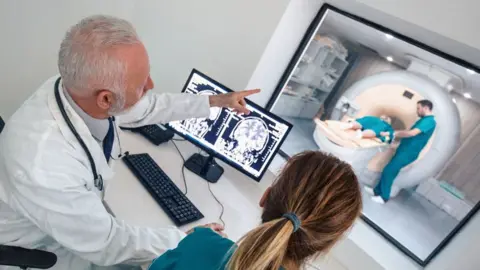Cancer: 'Worrying gap' over patients being seen in Wales since pandemic
 Getty Images
Getty ImagesThere were nearly 20% fewer patients referred for cancer treatment in July in Wales, compared to the year before.
Although 20% up on June, this is nearly 3,000 patients fewer than in July 2019.
The figures from NHS Wales count patients as soon as there is a suspicion of cancer - not from when they are referred to hospital and a diagnosis has been made.
One cancer charity estimated 2,000 people could have undiagnosed cancer over the covid pandemic.
Back in June, the Welsh Government launched a campaign urging people with suspicions of symptoms to be checked out, saying it had "worked hard" to ensure services continued.
The latest figures show:
- 11,903 patients entered the single cancer pathway in July, a rise of 20 on June 2020
- But it is 19.7% or 2,914 fewer patients fewer than in July 2019
- In July, 1,239 newly diagnosed patients were treated - 67 more than in June, but 252 fewer than in July 2019
Judi Rhys, chief executive at Tenovus Cancer Care, said she was encouraged by a "significant increase" in referrals for cancer diagnosis.
But she said there needed to be a clear plan for dealing with "pent up demand".
Macmillan Cancer Support said despite signs of more patients being referred, there was still a "large and worrying gap" between the numbers tested and treated and the numbers it would realistically expect to see.
Richard Pugh, head of partnerships, said: "There could be thousands of people in Wales with an undiagnosed or untreated cancer because of the impact of coronavirus.
"With growing concern over winter pressures, predictions of a second wave of coronavirus and two areas of Wales already in local lockdowns, we need to make sure that people with cancer do not get left behind."
Earlier this week, unveiling plans for the winter, NHS Wales chief executive Dr Andrew Goodall said cancer was an area that was prioritised all the way through the pandemic so far.
There are also plans to segregate areas in hospitals to ensure treatment can continue, even if there are more coronavirus cases in the next few months.
"We were worried when referrals dropped down by about 60% early on. But referrals have recovered to levels higher than I would normally expect to see," said Dr Goodall.
"But cancer treatment activity is still a bit lower than I would expect to see. We need to make sure we work through a plan to deal with people on waiting lists."
